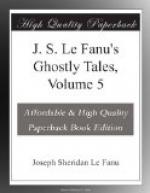There was but little light in the hall, and that little lost itself in darkness in the background. It was very spacious and lofty, with a gallery running round it, which, when the door was open, was visible at two or three points. Almost in the dark my new acquaintance led me across this wide hall into the room destined for my reception. It was spacious, and wainscoted up to the ceiling. The furniture of this capacious chamber was old-fashioned and clumsy. There were curtains still to the windows, and a piece of Turkey carpet lay upon the floor; those windows were two in number, looking out, through the trunks of the trees close to the house, upon the lake. It needed all the fire, and all the pleasant associations of my entertainer’s red nose, to light up this melancholy chamber. A door at its farther end admitted to the room that was prepared for my sleeping apartment. It was wainscoted, like the other. It had a four-post bed, with heavy tapestry curtains, and in other respects was furnished in the same old-world and ponderous style as the other room. Its window, like those of that apartment, looked out upon the lake.
Sombre and sad as these rooms were, they were yet scrupulously clean. I had nothing to complain of; but the effect was rather dispiriting. Having given some directions about supper—a pleasant incident to look forward to—and made a rapid toilet, I called on my friend with the gaiters and red nose (Tom Wyndsour) whose occupation was that of a “bailiff,” or under-steward, of the property, to accompany me, as we had still an hour or so of sun and twilight, in a walk over the grounds.
It was a sweet autumn evening, and my guide, a hardy old fellow, strode at a pace that tasked me to keep up with.
Among clumps of trees at the northern boundary of the demesne we lighted upon the little antique parish church. I was looking down upon it, from an eminence, and the park-wall interposed; but a little way down was a stile affording access to the road, and by this we approached the iron gate of the churchyard. I saw the church door open; the sexton was replacing his pick, shovel, and spade, with which he had just been digging a grave in the churchyard, in their little repository under the stone stair of the tower. He was a polite, shrewd little hunchback, who was very happy to show me over the church. Among the monuments was one that interested me; it was erected to commemorate the very Squire Bowes from whom my two old maids had inherited the house and estate of Barwyke. It spoke of him in terms of grandiloquent eulogy, and informed the Christian reader that he had died, in the bosom of the Church of England, at the age of seventy-one.
I read this inscription by the parting beams of the setting sun, which disappeared behind the horizon just as we passed out from under the porch.
“Twenty years since the Squire died,” said I, reflecting as I loitered still in the churchyard.




